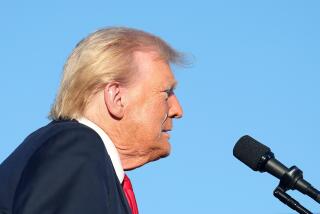Prosecutor Drops ‘Betrayal’ Tack in Miller’s Retrial
- Share via
In a dramatic change from the opening of Richard W. Miller’s first espionage trial, U.S. Atty. Robert C. Bonner emphasized to a jury Wednesday that the government has not charged that the former FBI agent ever “intended to betray his country or harm the United States.”
Quickly pouncing on Bonner’s comments in the opening of Miller’s second espionage trial, defense lawyer Stanley Greenberg said Miller has always maintained that he “was not out to harm the United States” when he became involved with Soviet agents in 1984.
“I heard Mr. Bonner say they’re not accusing him of that,” Greenberg said. “If that’s the case, then why are we here?”
Bonner’s remarks were part of a cautious government approach to Miller’s espionage retrial aimed at minimizing some of the major jury disputes--including the question of Miller’s intent--that contributed to a deadlock and a mistrial at the end of the first trial last November.
At the beginning of the first trial, Bonner said Miller was “pursuing his own venal scheme and not the interest of the FBI or his country.” Later, he dismissed the former agent’s claims that he was trying to infiltrate the Soviet KGB as “baloney.”
However, on Wednesday, as he ended his opening statement in Miller’s retrial, Bonner made a point of emphasizing that the government did not have to prove that Miller meant to harm the United States to convict him on seven counts of espionage and related bribery charges.
“None of the seven counts charge that Miller intended to betray his country or harm the United States,” Bonner said. “We do not believe that we need to prove an intent to betray the United States, because that is not charged.”
Miller, 49, a former FBI counterintelligence agent in Los Angeles, was arrested Oct. 2, 1984, on charges of conspiring with Russian emigres Nikolai and Svetlana Ogorodnikova and passing secret FBI information to the Soviet Union in exchange for a promised $65,000 in gold and cash, and a trench coat.
The most serious of the seven charges against him include the espionage conspiracy count and a second charge of actually passing a copy of the FBI’s Positive Intelligence Reporting Guide related to the national defense, both specifying that Miller had “reason to believe that it would be used to the injury of the United States and to the advantage of a foreign nation.”
However, U.S. District Judge David V. Kenyon told jurors in the first trial that the government did not have to prove that Miller had reason to believe the information would be both harmful to the United States and helpful to the Soviet Union.
“Rather, the charge requires only that the defendant have reason to believe that the information would be used either to the injury of the United States or to the advantage of a foreign nation,” Kenyon instructed the first jury.
Miller was arrested after first notifying his FBI superiors on Sept. 27, 1984, that he had become involved with Svetlana Ogorodnikova in an effort to salvage his mediocre 20-year career by becoming the first FBI agent to infiltrate an active Soviet KGB spy ring, thus helping both himself and his country.
The government, however, has claimed that Miller invented that story after becoming aware of FBI surveillance of his activities during the previous month.
As both sides finished their opening comments Wednesday, Bonner emphasized that Miller had confessed to eight different people that he had passed the intelligence guide to Ogorodnikova.
Responding to Bonner’s remarks, Greenberg described Miller as a well-intentioned “bumbler and fumbler” who should never have been hired by the FBI.
“If you want an image to stick with, think of an overweight Inspector Clouseau,” Greenberg added, referring to the inept French detective portrayed by Peter Sellers in the “Pink Panther” movies.
Greenberg said the FBI had prejudged Miller as guilty when his involvement with Ogorodnikova was first learned in late August, 1984, and said FBI interrogators grilled Miller relentlessly for five days, making it clear they thought Miller was a traitor.
“From our perspective, the case is going to turn on what happened during this five-day period,” Greenberg said. “He did not become a slick guy in this five-day period. He was the same bumbler and fumbler, and he was in the hands of experts.
“He’s going to be quoted (by prosecution witnesses) as saying he gave her the documents,” Greenberg said. “We deny categorically that any secret document was delivered.”
More to Read
Sign up for Essential California
The most important California stories and recommendations in your inbox every morning.
You may occasionally receive promotional content from the Los Angeles Times.













